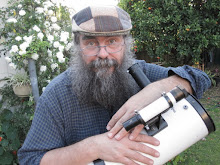Wednesday, April 24, 2013
Occultation of Alpha Librae (Zubenelgenubi), evening April 26, 2013
 The morning sky facing north-east in Adelaide on April 26 at
19:00 pm ACST showing the full Moon just about to cover Alpha
Librae,(the bright dot just on the edge of the Moon). (similar views will be seen from other
locations at a similar local time eg 20:01 pm AEST Brisbane.
The morning sky facing north-east in Adelaide on April 26 at
19:00 pm ACST showing the full Moon just about to cover Alpha
Librae,(the bright dot just on the edge of the Moon). (similar views will be seen from other
locations at a similar local time eg 20:01 pm AEST Brisbane.The inset shows a telescopic view of the Moon at 19:30 ACST, with alpha1 (the dim star) and alpha2 Librae about to go behind the Moon (click to embiggen).
April 26 is a fairly busy day, astronomy wise. in the morning, we have a partial eclipse of the Moon, and in the evening the waning Moon passes in front of the bright star Alpha Librae (which rejoices in the name Zubenelgenubi) in the constellation of the Libra the balance.
Alpha Librae is a double star with both stars visible to the unaided eye (magnitude 3 and 5 components). The times shown in the table below are for the bright component of the double star, but the 5th magnitude star disappears and reappears 5 minutes earlier.
With the Moon Full, this event is really best seen with binoculars or a small telescope (especially for the disappearance of the star on the bright limb of the Moon). If you have a tripod or other stand for your binoculars, it will be much easier to observe. Set up about half an hour before the occultation to watch the star disappear (so you are not mucking around with equipment at the last moment).
| City | Disappears behind bright limb | Reappears from dark limb |
| Australia | ||
| Adelaide (ACST) | 19:41 | 20:30 |
| Brisbane (AEST) | 20:01 | 21:05 |
| Canberra (AEST) | 20:12 | 21:11 |
| Darwin (ACST) | -- | 20:03 |
| Alice Springs (ACST) | 19:18 | 20:14 |
| Townsville (AEST) | 19:58 | 20:47 |
| Hobart (AEST) | 20:29 | 21:14 |
| Melbourne (AEST) | 20:17 | 21:08 |
| Perth (AWST) | -- | 18:48 |
| Sydney (AEST) | 20:10 | 21:12 |
Labels: Moon, Occultation



 Click to read about or order
Click to read about or order Click to read about or order
Click to read about or order Click to read about or order
Click to read about or order Click to read about or order
Click to read about or order




